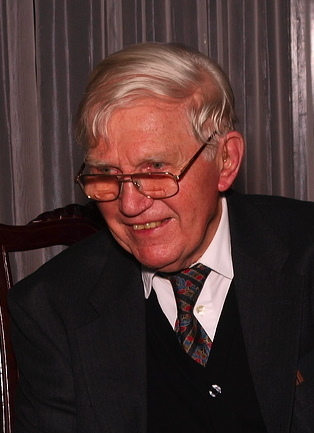
Friday Dec 31, 2010
Interview with Dr Z.A.Pelczynski on teaching in higher education and the academic writing style
'My name is Jonathan Vernon. I am studying for a Masters in Open and Distance Education with the Open University.'
This is how I introduce this interview. Only four questions were put, and the desired running length was under five minutes; just because it runs to nearly half an hour doesn't make it any the less interesting, though as an exercise in working to parameters it is intended to edit this down to the desired length.
 This interview has two parts, in the first I ask Dr. Z.A. Pelczynski, a retired Oxford fellow and tutor what it means to teach in tertiary education, compared to teaching in a primary or secondary school and secondly, the difference between writing in an academic, compared to a journalistic style.
My interest was this, in the context of module H808 'The E-learning Professional,' part of the Open University MA in Open and Distance Education, can a university tutor, lecturer or fellow, who may have several degrees and be a subject matter expert be considered professional if they haven't also had some formal teacher training.
Secondly, as a student, at school, at university and now as a post-graduate, my writing style has always been described, despite my best efforts to make it otherwise, been described as 'journalistic;' how therefore do I develop an 'academic' writing style.
On retiring some 15 years ago, Dr Pelzynski developed his interest in Poland further by establishing 'The School for Leaders.' Some would question if leadership can be taught: I had that question for him, but in relation to e-learning I wondered if online learning had something to contribute.
The interview was recorded on Thursday, 30th December at Dr Pelczynski's home.
It is offered here, initially as an unedited 28 minute, single take. It was recorded using a professional Roland, Endirol, digital recorder, uploaded to a MacBook and transcribed using Audacity. The intention, having recorded a buzz track, will be to retain the first two questions, which run to around 9 minutes and edit them down to less than 5 minutes.
The edit will close a series of pauses caused by a dog tracking us down and enterring his study and to emphasise the most telling and pertinent points.
The transcript of this edited version will be offered to support the listening experience and to link to a number of references.
To achieve this edit I will re-record the questions that I put, keeping them succinct. I will also record a 'buzz track' in his study, this is a minute of ambient sound that will help paste over the edit points. I may prefer to edit in iMovies or Quicktime, rather than Audacity. I'm loathe to purchase professional editing software.
On reflection, and as I would have done when working in the media professionally, I would have re-recorded the question where we interrupted, perhaps even gone for a second or third take where I thought the response could have been more succinct. Asked what we'd be talking about I made the mistake of running through each question beforehand - I say in error, because Dr Pelczynski immediately offered responses and often it is these first moments, when someone is first 'challenged' that they say something of most pertinent.
The pleasure I find in listening to this as the spoken word is the obvious enjoyment Dr Pelczynski had as a tutor and fellow for several decades and the genuine desire to bring the best out of his students.
This interview has two parts, in the first I ask Dr. Z.A. Pelczynski, a retired Oxford fellow and tutor what it means to teach in tertiary education, compared to teaching in a primary or secondary school and secondly, the difference between writing in an academic, compared to a journalistic style.
My interest was this, in the context of module H808 'The E-learning Professional,' part of the Open University MA in Open and Distance Education, can a university tutor, lecturer or fellow, who may have several degrees and be a subject matter expert be considered professional if they haven't also had some formal teacher training.
Secondly, as a student, at school, at university and now as a post-graduate, my writing style has always been described, despite my best efforts to make it otherwise, been described as 'journalistic;' how therefore do I develop an 'academic' writing style.
On retiring some 15 years ago, Dr Pelzynski developed his interest in Poland further by establishing 'The School for Leaders.' Some would question if leadership can be taught: I had that question for him, but in relation to e-learning I wondered if online learning had something to contribute.
The interview was recorded on Thursday, 30th December at Dr Pelczynski's home.
It is offered here, initially as an unedited 28 minute, single take. It was recorded using a professional Roland, Endirol, digital recorder, uploaded to a MacBook and transcribed using Audacity. The intention, having recorded a buzz track, will be to retain the first two questions, which run to around 9 minutes and edit them down to less than 5 minutes.
The edit will close a series of pauses caused by a dog tracking us down and enterring his study and to emphasise the most telling and pertinent points.
The transcript of this edited version will be offered to support the listening experience and to link to a number of references.
To achieve this edit I will re-record the questions that I put, keeping them succinct. I will also record a 'buzz track' in his study, this is a minute of ambient sound that will help paste over the edit points. I may prefer to edit in iMovies or Quicktime, rather than Audacity. I'm loathe to purchase professional editing software.
On reflection, and as I would have done when working in the media professionally, I would have re-recorded the question where we interrupted, perhaps even gone for a second or third take where I thought the response could have been more succinct. Asked what we'd be talking about I made the mistake of running through each question beforehand - I say in error, because Dr Pelczynski immediately offered responses and often it is these first moments, when someone is first 'challenged' that they say something of most pertinent.
The pleasure I find in listening to this as the spoken word is the obvious enjoyment Dr Pelczynski had as a tutor and fellow for several decades and the genuine desire to bring the best out of his students.
No comments yet. Be the first to say something!